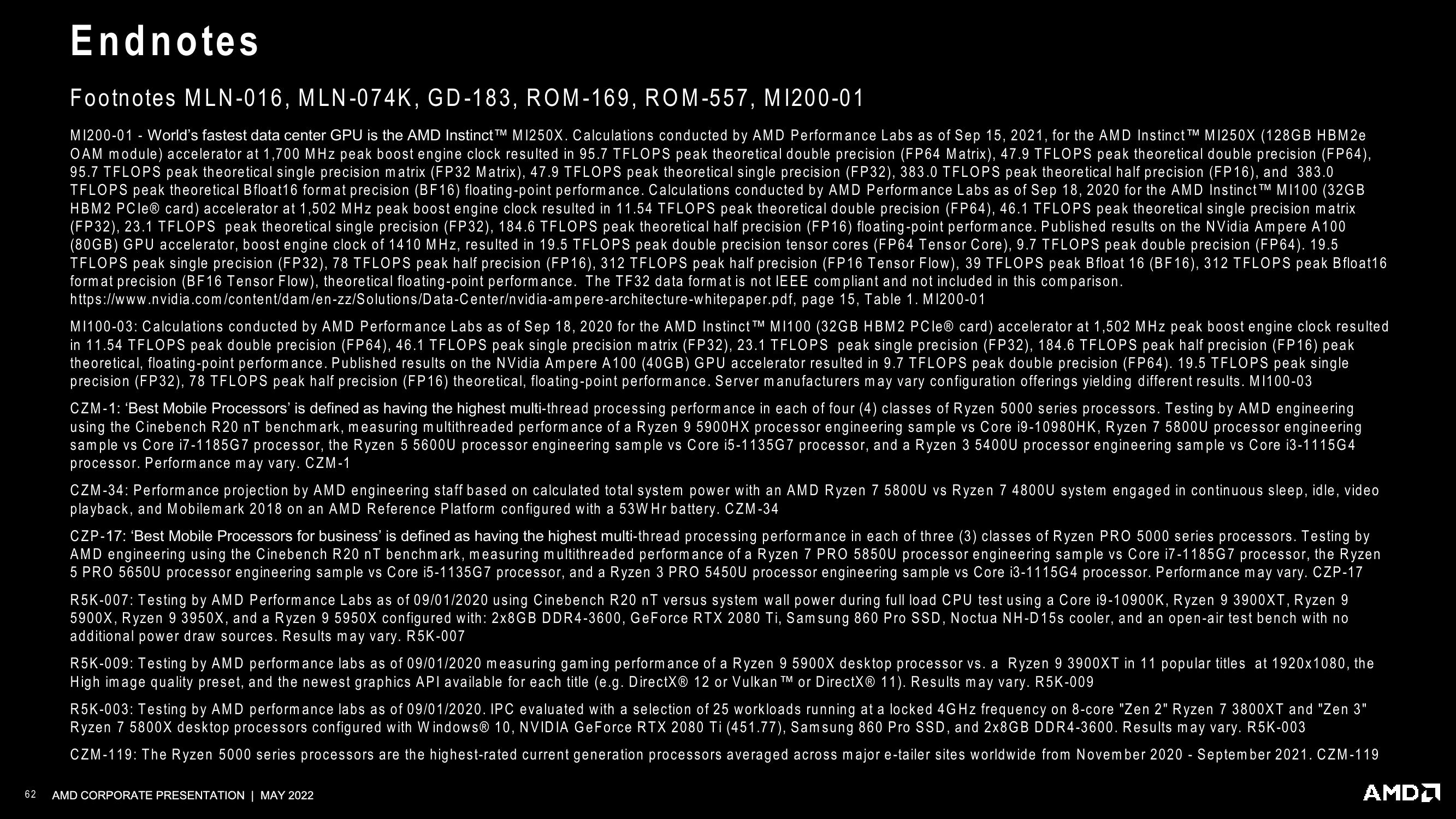AMD Investor Presentation Deck
62
Endnotes
Footnotes MLN-016, MLN-074K, GD-183, ROM-169, ROM-557, M1200-01
M1200-01 - World's fastest data center GPU is the AMD Instinct TM M1250X. Calculations conducted by AMD Performance Labs as of Sep 15, 2021, for the AMD Instinct TM M1250X (128GB HBM2e
OAM module) accelerator at 1,700 MHz peak boost engine clock resulted in 95.7 TFLOPS peak theoretical double precision (FP64 Matrix), 47.9 TFLOPS peak theoretical double precision (FP64),
95.7 TFLOPS peak theoretical single precision matrix (FP32 Matrix), 47.9 TFLOPS peak theoretical single precision (FP32), 383.0 TFLOPS peak theoretical half precision (FP16), and 383.0
TFLOPS peak theoretical Bfloat16 form at precision (BF16) floating-point performance. Calculations conducted by AMD Performance Labs as of Sep 18, 2020 for the AMD Instinct TM MI100 (32GB
HBM2 PCIe® card) accelerator at 1,502 MHz peak boost engine clock resulted in 11.54 TFLOPS peak theoretical double precision (FP64), 46.1 TFLOPS peak theoretical single precision matrix
(FP32), 23.1 TFLOPS peak theoretical single precision (FP32), 184.6 TFLOPS peak theoretical half precision (FP16) floating-point performance. Published results on the NVidia Ampere A100
(80GB) GPU accelerator, boost engine clock of 1410 MHz, resulted in 19.5 TFLOPS peak double precision tensor cores (FP64 Tensor Core), 9.7 TFLOPS peak double precision (FP64). 19.5
TFLOPS peak single precision (FP32), 78 TFLOPS peak half precision (FP16), 312 TFLOPS peak half precision (FP16 Tensor Flow), 39 TFLOPS peak Bfloat 16 (BF16), 312 TFLOPS peak Bfloat16
format precision (BF16 Tensor Flow), theoretical floating-point performance. The TF32 data format is not IEEE compliant and not included in this comparison.
https://www.nvidia.com/content/dam/en-zz/Solutions/Data-Center/nvidia-ampere-architecture-whitepaper.pdf, page 15, Table 1. MI200-01
MI100-03: Calculations conducted by AMD Performance Labs as of Sep 18, 2020 for the AMD Instinct TM MI100 (32GB HBM2 PCIe® card) accelerator at 1,502 MHz peak boost engine clock resulted
in 11.54 TFLOPS peak double precision (FP64), 46.1 TFLOPS peak single precision matrix (FP32), 23.1 TFLOPS peak single precision (FP32), 184.6 TFLOPS peak half precision (FP16) peak
theoretical, floating-point performance. Published results on the NVidia Ampere A100 (40GB) GPU accelerator resulted in 9.7 TFLOPS peak double precision (FP64). 19.5 TFLOPS peak single
precision (FP32), 78 TFLOPS peak half precision (FP16) theoretical, floating-point performance. Server manufacturers may vary configuration offerings yielding different results. MI100-03
CZM-1: 'Best Mobile Processors' is defined as having the highest multi-thread processing performance in each of four (4) classes of Ryzen 5000 series processors. Testing by AMD engineering
using the Cinebench R20 nT benchmark, measuring multithreaded performance of a Ryzen 9 5900HX processor engineering sample vs Core i9-10980HK, Ryzen 7 5800U processor engineering
sample vs Core i7-1185G7 processor, the Ryzen 5 5600U processor engineering sample vs Core i5-1135G7 processor, and a Ryzen 3 5400U processor engineering sample vs Core i3-1115G4
processor. Performance may vary. CZM-1
CZM-34: Performance projection by AMD engineering staff based on calculated total system power with an AMD Ryzen 7 5800U vs Ryzen 7 4800U system engaged in continuous sleep, idle, video
playback, and Mobilemark 2018 on an AMD Reference Platform configured with a 53W Hr battery. CZM-34
CZP-17: 'Best Mobile Processors for business' is defined as having the highest multi-thread processing performance in each of three (3) classes of Ryzen PRO 5000 series processors. Testing by
AMD engineering using the Cinebench R20 nT benchmark, measuring multithreaded performance of a Ryzen 7 PRO 5850U processor engineering sample vs Core i7-1185G7 processor, the Ryzen
5 PRO 5650U processor engineering sample vs Core i5-1135G7 processor, and a Ryzen 3 PRO 5450U processor engineering sample vs Core i3-1115G4 processor. Performance may vary. CZP-17
R5K-007: Testing by AMD Performance Labs as of 09/01/2020 using Cinebench R20 nT versus system wall power during full load CPU test using a Core i9-10900K, Ryzen 9 3900XT, Ryzen 9
5900X, Ryzen 9 3950X, and a Ryzen 9 5950X configured with: 2x8GB DDR4-3600, GeForce RTX 2080 Ti, Samsung 860 Pro SSD, Noctua NH-D15s cooler, and an open-air test bench with no
additional power draw sources. Results may vary. R5K-007
R5K-009: Testing by AMD performance labs as of 09/01/2020 measuring gaming performance of a Ryzen 9 5900X desktop processor vs. a Ryzen 9 3900XT in 11 popular titles at 1920x1080, the
High image quality preset, and the newest graphics API available for each title (e.g. DirectX® 12 or Vulkan TM or DirectX® 11). Results may vary. R5K-009
R5K-003: Testing by AMD performance labs as of 09/01/2020. IPC evaluated with a selection of 25 workloads running at a locked 4GHz frequency on 8-core "Zen 2" Ryzen 7 3800XT and "Zen 3"
Ryzen 7 5800X desktop processors configured with Windows® 10, NVIDIA GeForce RTX 2080 Ti (451.77), Samsung 860 Pro SSD, and 2x8GB DDR4-3600. Results may vary. R5K-003
CZM-119: The Ryzen 5000 series processors are the highest-rated current generation processors averaged across major e-tailer sites worldwide from November 2020 - September 2021. CZM-119
AMD CORPORATE PRESENTATION | MAY 2022
AMDView entire presentation